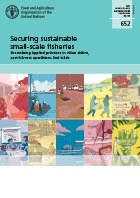Abstract
Madagascar, one of the poorest countries in the world, has large coastal communities who rely heavily on various small-scale fisheries, such as mangrove mud crab (Scylla
serrata), for income. There has been a marked increase in mangrove mud crab fishing due to high international demand, and it is now the country’s third most valuable seafood export. This has led to overfishing, with documented decreases in quantity and average size of catches. Additionally, post-harvest losses along the value chain lead to lost value, due to poor handling, transport and storage. This lost value further reduces the earnings and food security of the coastal communities who depend on this fishery. The Smartfish Programme, jointly implemented by the Indian Ocean Commission and the Food and Agriculture Organization of the United Nations and funded by the
European Union, worked with the Government of Madagascar’s ministry responsible for fisheries resources and locally-based NGOs including Blue Ventures and WWF, to assess methods of reducing exploitation of the fishery and increasing benefits to fishers and the wider supply chain. This case study reviews practical approaches to recover lost value in the mangrove mud crab fishery, highlighting low cost interventions that can increase yields even in the face of falling catches. The value of catches were augmented by obtaining higher prices for export crabs (around half of the annual harvest) and reducing post-harvest losses, providing a practical example of how low-cost changes in behaviour, logistics and technique can reduce post-harvest losses, helping fishers to earn more while catching less.
Keywords: Mud crab, Scylla serrata, Madagascar, mangroves, mangrove fisheries, value chain improvement, post-capture losses, small-scale fisheries, traditional fisheries.

















